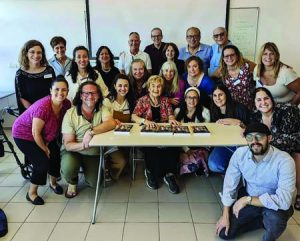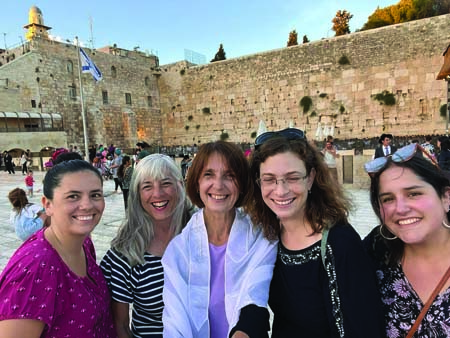By Ramona L. Brand, Director of Youth Learning, Temple Beth-El
On a sticky July evening, this summer in Jerusalem, I sat in a low-ceilinged meeting room at the Prima Kings hotel with twenty other people who, like me, were about to participate in The International School for Holocaust Studies Seminar for Educators at Yad Vashem.
We were all strangers, but over the next eight days would go on an educational and emotional journey and emerge colleagues and friends. Our cohort consisted of synagogue school directors and teachers, Holocaust Museum docents, and educators from a variety of Jewish agencies across the U.S. and Canada.
We were also a diverse group from the entire spectrum of age, experience, and affiliation. The focus of the seminar covered Yad Vashem’s pedagogical approach on how to educate students about The Shoah, a clearly traumatic event, without retraumatizing them in the process.
Under the superb direction of Rabbi Moshe Cohen, head of the World Jewish Section at Yad Vashem and Lori Gerson, Education Coordinator, we embarked on an intensive course of classes that would guide us, challenge us and walk us through the process of building an intentional curriculum for adults and children that was factual, age appropriate, used primary resources, emotionally supportive and took the learner ‘safely in and safely out’ of a very difficult subject.

Yad Vashem’s program was extensive and exemplary. We were privileged to meet with experts from every aspect of Holocaust education, which included history, philosophy, social science, art and literature and meeting with inspiring Survivor, Rena Quint. In addition to the knowledge we gained, we received generous resources to enhance our curriculum.
I was gratified to learn that our yearlong curriculum for seventh graders was already close to Yad Vashem’s approach. Still, I learned what we needed to change and how we will be able to improve learning for our students.
Upon returning from the Seminar, I met with our school’s Holocaust teacher, Brandon Metheny, and planned the implementation of Yad Vashem’s process and materials into our curriculum.
If my experiences were limited to the educational process of the seminar, it would have been an outstanding experience. What elevated it was the bonding and personal experiences shared with my fellow educators during the seminar.
One remarkable experience after another occurred over the week. A participant recognized her father in the picture of survivors at Buchenwald Concentration Camp celebrating a Shavuot service after liberation.
Another showed her documentary, “Letters from Brno,” which came out of decades of researching her mother’s hidden past. Just a few days after viewing her powerful film, we were thrilled with and for her, to learn that it had been accepted by PBS and will be aired sometime in the coming months.
Yet another colleague shared his experience in finding of his father and family in the Auschwitz Album and the emotional impact of ‘reuniting’ his father with pictures of his long-gone parents and siblings. In addition, we learned that almost all of us had personal connections to both Survivors and victims of the Shoah.
Outside of the classroom, we also bonded over dinners, excursions into the Shuk, the Kotel, and Ben Yehuda Street. We explored Jerusalem in our limited free time. We celebrated Shabbat and Havdalah together.
We celebrated our learning and friendship knowing we would travel back to our communities with greater knowledge, a connected cohort, and with sharper tools to do this work. We have stayed connected since returning home and continue to cheer each other on both personally and professional.
Our first ‘reunion’ occurred just before Rosh Hashana, with a “Zoom L’chaim” meeting. It was wonderful to be together again, albeit virtually.
Spending over a week immersed in Holocaust education could have been dark and depressing, but it was far from. It was often somber but also sacred. We learned facts, but also personal human stories of courage, faith, resistance, spirit, and of making heartbreaking choiceless choices. Of goodness and evil. Of survival against all odds. Of knowing how to recognize and resist the road to human degradation.
I learned in honor of those who survived, and in memory of those who did not. For my Aunt Leila, her sister Harriet, my Great Uncle Max, and Great Aunt Erna, whose lives were forever changed by Kristallnacht. For my husband, Harlan Loebman’s cousin Fritz, and Fritz’s mother Matilde, who were murdered in Auschwitz and Fritz’s father Julius who came to the US without his wife and only child. One only needs to look around to see that a rise in anti-Semitism, othering, hatemongering, and Fascist leanings are growing at home and around the world.
One overarching lesson from Yad Vashem is clear. It is our obligation to amplify the voices of those past, to ensure a safer future.
My sincere gratitude to Temple Beth-El and the Richmond Council for Jewish Education/Jewish Community Federation of Richmond for making it possible for me to attend this program.
For more information, reach out to r.brand@bethelrichmond.org.





